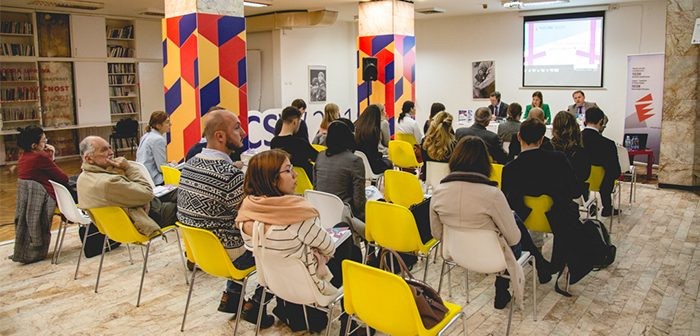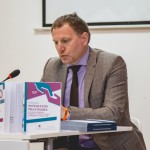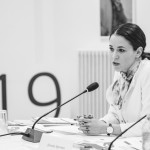Challenges of Integrating the Judiciary in Kosovo
The Effects of the Agreement between Belgrade and Pristina on Access to Justice
The House of Human Rights and Democracy, May 9, 2019
The Lawyers’ Committee for Human Rights YUCOM organized the conference “Challenges of Integrating the Judiciary in Kosovo – The Effects of the Agreement between Belgrade and Pristina on Access to Justice” with the aim of presenting the publication “Integration of the Judiciary in the Context of Belgrade-Pristina Dialogue and the EU Accession Process”. The publication has presented a unique overview of the implementation and effects of the Justice Agreement reached within the Brussels dialogue, as well as the fulfillment of all related activities that Serbia has undertaken in the process of accession to the European Union, through Chapters 23 and 35. The publication is the result of the project “Towards Stronger Judiciary through Citizens’ Monitoring” which has been implemented with the support of the Royal Norwegian Embassy in Belgrade and the Balkan Trust for Democracy.
In her opening statement, Katarina Golubovic, President of the Lawyers’ Committee for Human Rights – YUCOM, welcomed the attendees, pointing out that integration of the judiciary was an initiative of the European Union, and taking that opportunity to wish a happy Day of Europe to all. She gave her thanks to the Royal Norwegian Embassy, as well as the Balkan Trust for Democracy, for their support, which this report could not have been created without. She took the opportunity to point out that this is the first report to be published on this topic. She recalled that the Brussels Agreement was reached in 2013, and that the Justice Agreement, whose implementation began in 2017, is its direct product, and therefore talks about the cessation of the work of parallel institutions, the formation of an integrated judiciary with the obligatory involvement of Serbian judges and prosecutors and mandated use of the Serbian language. The general assessment is that little progress has been made regarding access to justice, legal security and predictability for all citizens. She added that there is a problem with acts and decisions by so-called ‘parallel institutions’ occurred before the beginning of the implementation of the Agreement, not being recognized and being left unable to be carried out in the territory of Kosovo. She pointed out that the resolution of these problems is being hampered by political dialogue, as well as a lack of EU mechanisms for interpreting provisions relating to the judiciary. She added that a number of activities had been carried out under the motto ”citizens for a stronger judiciary”, and that the most significant had been the production of two reports — one being related to the implementation of measures relating to the judiciary contained in the Action Plan for Chapter 23, and the second being the report presented at the conference.
Geir Håkon Johansen, First Secretary of the Royal Norwegian Embassy, stressed that funding civil society organizations is essential in order to form activities that contribute to the implementation of the reform. The reform is complex at the technical, administrative and political levels. He noted that institutional reforms must be sustainable, that monitoring of their implementation by the civil society is crucial, and that this is one of the reasons why the Royal Norwegian Embassy has been supporting the project. The project is a part of strengthening the integration of Macedonia, Montenegro and Serbia, and the scheme refers to Chapters 5, 8, 23, 24, 32 and 35, where Chapters 23 and 35 are of special importance.
Dragisa Mijacic, the coordinator of the Working Group of the National Convention on the EU for Chapter 35, pointed out that the main goal is to normalize Belgrade-Pristina relations and reiterated that the Brussels Dialogue should be a guideline for the direction in which normalization will take place. This process is seen as a parallel to the process of Serbia’s integration into the EU, and has been moved forward by engaging in dialogue and working to normalize relations. With the opening of Chapter 35, the Brussels Agreement is being completed, and the kind of progress Serbia required to achieve is being defined. He pointed out that the criteria have been divided into three parts: 1) Brussels Agreement and provisions’ implementation, 2) implementation of technical dialogues from February 2011 to March 2012, 3) normalization of relations.
He reminded attendees that the European Commission and each EU representative should report to the European Council twice a year on the course of the implementation of Chapter 35, although the criteria are clear and concrete. Since the European Commission has not submitted any documents, we do not know its position. He noted that political circumstances have changed since 2015 and that only three agreements have been achieved: 1) the Agreement on the Community of Serb Municipalities (which has not been implemented), 2) the Telecommunications Agreement (which has largely been implemented), 3) the Agreement on Integration of the Judiciary. He added that status has been discussed more than the normalization of relations, and noted that the process has been slowed down.
Jovana Spremo, advisor for EU integration related policies at the Lawyers’ Committee for Human Rights – YUCOM, pointed out that the process of research and monitoring began from the first agreement in 2013, along with the monitoring of the process of Serbia’s accession to the EU and its obligations under Chapter 35. She recalled that the integrated judiciary was supposed to resolve the problem of the parallel functioning of institutions in Kosovo. The implementation of the Law on Amnesty was made possible in 2013 for representatives of the judiciary and police, and, according to the Agreement, the integration should have occurred in 2013. She pointed out that the parties concurred on the basic principles of the Agreement in 2015. She noted that the text of the Agreement has not been worked out in detail and that it doesn’t include an implementation plan and timetable. She emphasized that the beginning of the implementation of the agreement was on October 24, 2017, and that a total of 40 judges and 13 prosecutors have been integrated, along with 145 employees in Serbian judicial structures in Kosovo.
She stressed that there is no developed set of activities for meeting the transitional criteria of Chapter 35 relating to the judiciary, and that it is therefore difficult to measure the fulfillment of the same. Furthermore, no special law has been passed in relation to courts and prosecutor’s offices in the area of AP Kosovo and Metohija, and it is not known that there is realistic intent to adopt such an act. She also pointed out that reporting is not being carried out in an adequate manner. She added that the Office for Kosovo and Metohija publishes semi-annual reports, but that there is a lack of coverage for half of 2018, and that it was the key period when the integrated justice system supposed to have been brought to life.
Katarina Toskic, a legal advisor at the Lawyers’ Committee for Human Rights – YUCOM, spoke about the situation when it comes to the problems of implementation of the Justice Agreement. She underlined that, after the preparatory research, field research was subsequently carried out through a series of interviews with representatives of Kosovo’s judicial institutions, integrated judges, lawyers and the NGO sector. She noted that the formal agreement was being applied, but that the idea had not been deeply elaborated on. The research can be divided into three parts: 1) the manner of integration of the holders of judicial functions, 2) the challenges for the real functioning of an integrated judiciary, 3) the effects on citizens and enabling a functional approach to justice.
Regarding the jurisdiction to handle and store old cases, she emphasized that the fate of the cases that began after 1999 and before 2017 is the least transparent. It was agreed that Serbian courts would stop their work in 2013, and would only proceed in emergencies such as domestic violence, interethnic conflicts, detention, and the like. She pointed out that the President of the Appellate Court in Nish issued a decision on the temporary transfer of jurisdiction of the Basic Court in Kosovska Mitrovica to the Basic Court in Leskovac and the High Court in Kosovska Mitrovica at the High Court in Leskovac in 2018. A large number of controversial cases were encountered, where the right to be tried within a reasonable time was violated and citizens were prevented from applying to jobs, from being issued a divorce, where children’s rights were violated, etc., directly violating the basic rights and freedoms of citizens.
Following this, Jovana Spremo spoke about the manner of being named to judicial or prosecutorial functions. She also mentioned the recognition of diplomas, saying that diplomas from universities in Serbia were not nostrified after 1999, but that, since 2015, it is now possible to verify diplomas issued by the University of Kosovska Mitrovica. There is a problem with regard to the non-recognition of the bar examination, which integrated judges were forced to retake, but they were allowed to do so in the Serbian language. Language issues were solved by allowing integrated judges to conduct the proceedings in their mother tongue, while an interpreter is assigned for each procedure. She noted that the criterion for translators is very strict, and as the lack of professional translators is a problem that is partially solved by project engagement of translators where criteria have been lowered. She pointed out that the quality of translation of laws is poor, and that there translations of judicial decisions are non-existent. Regarding the allocation and resolution of cases, she pointed out that the allocation of cases in a particular court decided by the president of the court, and that it is conducted based on language, whereas the distribution of cases among prosecutors is based on expertise, specialization and familiarity with the local environment, which significantly slows down proceedings.
During the research, it was noticed that a large number of cases were referred to mediation in order to avoid having to translate documents. Additionally, she mentioned the problem of the impossibility to validate court decisions originating from the period of parallel institutions. She stressed the need for a commission to be formed whose role would be to determine which decisions, and originating from which bodies in particular would be chosen to be reevaluated, which is still topic to be discussed. It has also been noted that there are no notaries and executors whose working language is Serbian, and that there is a very small number of lawyers in the north of Kosovo whose working language is also Serbian. The presentation was followed by a brief discussion.
More information on research findings and recommendations is available in the Report.






























